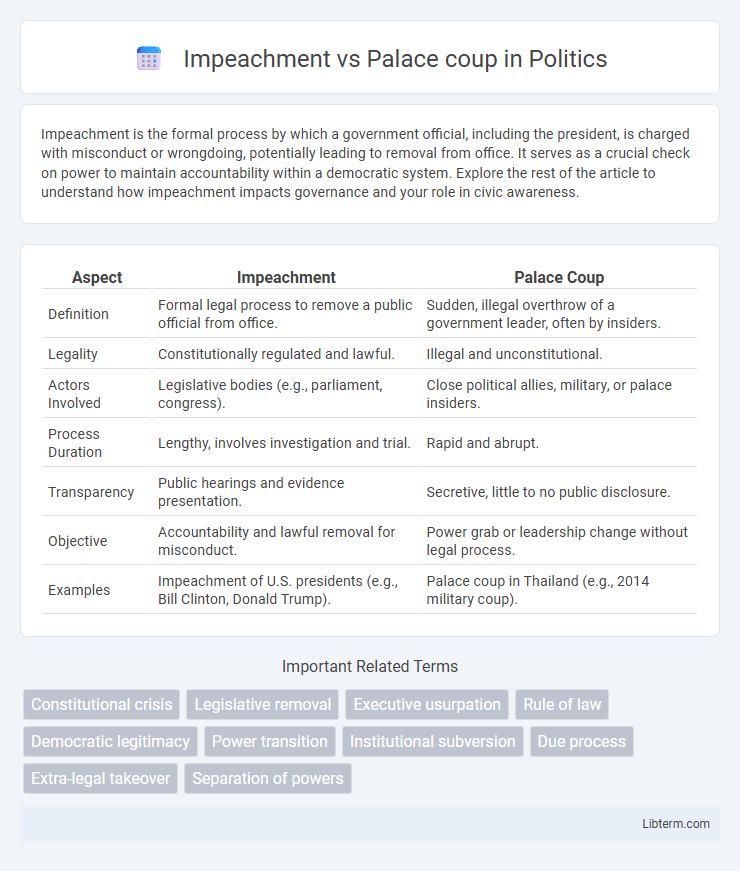Impeachment is the formal process by which a government official, including the president, is charged with misconduct or wrongdoing, potentially leading to removal from office. It serves as a crucial check on power to maintain accountability within a democratic system. Explore the rest of the article to understand how impeachment impacts governance and your role in civic awareness.
Table of Comparison
| Aspect | Impeachment | Palace Coup |
|---|---|---|
| Definition | Formal legal process to remove a public official from office. | Sudden, illegal overthrow of a government leader, often by insiders. |
| Legality | Constitutionally regulated and lawful. | Illegal and unconstitutional. |
| Actors Involved | Legislative bodies (e.g., parliament, congress). | Close political allies, military, or palace insiders. |
| Process Duration | Lengthy, involves investigation and trial. | Rapid and abrupt. |
| Transparency | Public hearings and evidence presentation. | Secretive, little to no public disclosure. |
| Objective | Accountability and lawful removal for misconduct. | Power grab or leadership change without legal process. |
| Examples | Impeachment of U.S. presidents (e.g., Bill Clinton, Donald Trump). | Palace coup in Thailand (e.g., 2014 military coup). |
Understanding Impeachment: Definition and Process
Impeachment is a constitutional process that formally charges a government official, typically a president or high-ranking politician, with misconduct or violations of law, leading to potential removal from office. The procedure usually involves legislative bodies, such as the House of Representatives initiating charges and the Senate conducting a trial to determine guilt or innocence. Unlike a palace coup, which is an abrupt and often extralegal seizure of power within a ruling elite, impeachment follows legal protocols and aims to uphold accountability through democratic institutions.
Exploring the Concept of a Palace Coup
A palace coup refers to a sudden and often clandestine overthrow of a government, typically orchestrated within the existing ruling elite or close circles of power, without involving mass public participation. Unlike impeachment, which is a formal, legal process usually initiated by legislative bodies to remove a public official for misconduct, a palace coup bypasses institutional procedures and relies on swift internal power shifts. This concept highlights the fragility of political structures where loyalty and control within the inner circle can determine regime stability.
Legal Framework: Impeachment vs Palace Coup
Impeachment operates within a formal legal framework defined by constitutional provisions, requiring specific grounds such as misconduct or abuse of power and involving a structured judicial or legislative process. A palace coup, in contrast, bypasses established legal procedures, often relying on sudden political maneuvering or force to remove a leader without adherence to constitutional or legal norms. The legitimacy of impeachment stems from adherence to rule of law, whereas palace coups are typically extralegal actions that undermine institutional governance.
Historical Examples of Impeachment
Historical examples of impeachment highlight its use as a constitutional process to remove public officials, such as the impeachment of U.S. President Andrew Johnson in 1868 and Bill Clinton in 1998, reflecting legal and political accountability within democratic frameworks. In contrast, palace coups, exemplified by the 1979 overthrow of Ethiopia's Emperor Haile Selassie, involve abrupt, often violent power shifts executed by insiders without formal legal procedures. Impeachment serves as a legal mechanism rooted in constitutional law, whereas palace coups bypass institutional checks and balances, frequently resulting in authoritarian rule.
Notable Palace Coups in Modern History
Notable palace coups in modern history include the 1979 overthrow of Mohammad Najibullah in Afghanistan and the 1991 coup against Valentin Strasser in Sierra Leone, both marked by swift, often violent shifts in executive power without legal impeachment processes. Unlike impeachment, which is a formal, constitutional procedure involving legislative bodies, palace coups typically entail abrupt power seizures by military or political elites. The distinction highlights the role of institutional legality versus forceful usurpation in political transitions.
Key Differences Between Impeachment and Palace Coup
Impeachment is a legal and constitutional process where a public official is charged with misconduct, typically involving legislative procedures and judicial review. A palace coup involves an abrupt, often extrajudicial seizure of power within a ruling elite or government, usually orchestrated by close insiders without formal legal proceedings. The key difference lies in impeachment's basis in law and due process versus the palace coup's reliance on force, secrecy, and internal power shifts.
Political Implications of Impeachment Proceedings
Impeachment proceedings serve as formal constitutional mechanisms for holding public officials accountable, often leading to significant political upheaval and shifts in power dynamics within democratic systems. This legal process can reinforce institutional checks and balances but also intensify political polarization and instability during transitions. Unlike palace coups, which are abrupt and extrajudicial power seizures, impeachment upholds legal frameworks that influence legitimacy and public trust in governance.
Consequences of a Palace Coup on Governance
A palace coup often results in abrupt leadership changes without legal procedures, undermining institutional stability and eroding public trust in governance. Such coups frequently lead to centralized power, reduced accountability, and weakened democratic institutions, destabilizing political systems. The long-term consequences include policy inconsistency, increased authoritarianism, and potential conflicts within the state's administrative structure.
Public Perception: Impeachment vs Palace Coup
Public perception of impeachment generally frames it as a legitimate, legal process rooted in constitutional procedures, enhancing transparency and democratic accountability. In contrast, a palace coup is often viewed negatively, perceived as an undemocratic, secretive power grab driven by elite interests without public endorsement. This stark difference influences citizens' trust in governance, often driving greater public support for impeachment over palace coups.
Safeguarding Democracy: Lessons and Preventive Measures
Impeachment upholds democratic principles by providing a legal and transparent process to hold leaders accountable, ensuring checks and balances within government institutions. Palace coups bypass constitutional procedures, often leading to authoritarian rule and undermining public trust in democratic governance. Strengthening judicial independence, enhancing civic education, and promoting transparent political accountability are crucial preventive measures to safeguard democracy against undemocratic power shifts.
Impeachment Infographic

 libterm.com
libterm.com